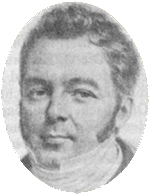 |
Georges Onslow (1784–1853)Georges Onslow (1784-1853), was born in Clermont-Ferrand, France. His father Edward was an nobleman who was forced to leave England following a homosexual scandal. In France he married a member of the aristocracy, and bought a castle. He gave his son Georges an education befitting his station, which included the study of music, travel, horsemanship and hunting.
Everything went swimmingly until 1789 when there was a revolution - which was slightly inconvenient for the Onslows. Edward was imprisoned, then sent into exile with his family in 1798. They were by now running out of bits of Europe from which they hadn't already fled, so they took a punt on Germany, where they settled in Hamburg. There Georges took piano lessons from Johann Ladislaus Dussek (1760-1812). In 1800 Georges moved to London while his father returned to France. Here Georges continued his education with Johann Baptiste Cramer (1771-1858), a pupil of the famous Muzio Clementi (1752-1832). Onslow was described by Antoine-François Marmontel as a pianist of "brilliant technique, skillful virtuosity, and beautiful sound". Around 1803 Georges Onslow returned to his parents in France. Back home he became a member of an amateur musical society. He learnt to play the cello and started to compose his first works: a piano sonata, string quintets and piano trios. By 1808 Onslow wanted to learn more about composition and began to look for a teacher. He contacted Anton Reicha (1770-1836), who agreed to teach him. In the following years Onslow composed a lot of chamber music. Later he composed some large scale works as well - three operas and four symphonies - Symphony No.2 is dedicated to the London Philharmonic Society (in 1830 Onslow was made a distinguished member). He was poular and respected, and was eleceted Luigi Cherubini's (1760-1842) successor in the Académie des Beaux Arts. Onslow was by now a major figure in French musical siciety, especially famed for his chamber music; he was widely known as the "French Beethoven". Unfortunately he took this epithet to its natural conclusion, having become deaf in one ear following a hunting accident in 1829. He also suffered from nervous headaches and a lack of belief in his own abilities which provoked a morbid depression during the last years of his life. He died on October 3rd, 1853 in his hometown. Clermont-Ferrand, unhappy, but famous. |